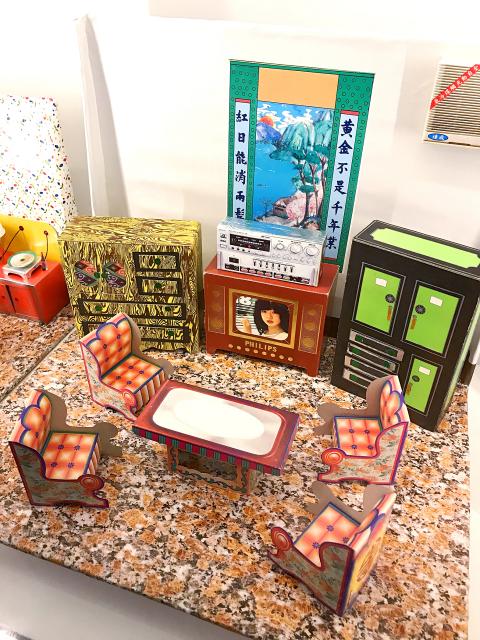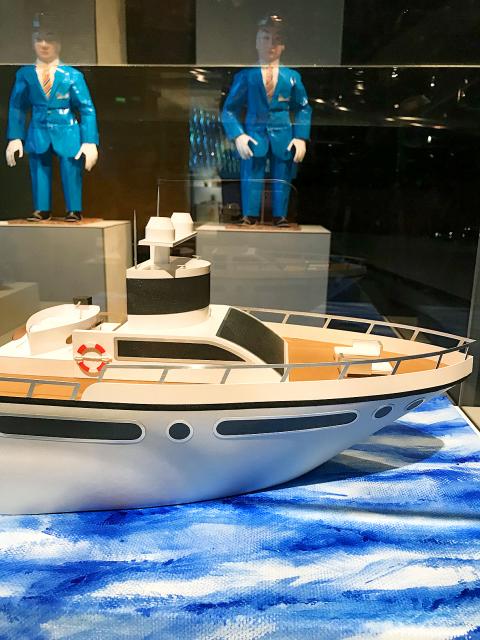An exhibition on the art of paper funeral offerings in Taiwan opened on Tuesday at the Quai Branly Museum in Paris and is to run until Oct. 27.
The exhibition, “Palace Paradis,” was organized by the museum, the Ministry of Culture’s Taiwan Cultural Center in Paris and the Kaohsiung Museum of Fine Arts.
The Paris museum is known for its collection of artifacts and art objects from non-European cultures. “Palace Paradis” is its first exhibition on Taiwan.

Photo: CNA
Burning papier-mache vehicles, houses and other objects for the deceased to use in the afterlife is part of Taiwan’s traditional funeral rites.
The paper creations on display were made by two Taipei paper studios: Hsin-Hsin and Skea, the organizers said.
The exhibition is divided into three themes: traditional offerings, including ghost houses, household goods and food; modern consumer items, such as handbags, cellphones, yachts and airplanes; and special ritual objects, such as items made for the annual Ghost Festival.

Photo: CNA
Taiwan’s paper funeral offerings first attracted the attention of the French art world when the Museum of Decorative Arts in Paris held an exhibition in 2016.
The exhibition was reportedly inspired by a trip to Taiwan by the organizer, who chanced upon villagers burning finely crafted paper offerings.
Hsin-Hsin master Chang Hsu-pei (張徐沛), 69, whose work was featured at the 2016 exhibition, said he is happy to see appreciation for votive papier-mache in France.
Chang said he had crafted ghost houses and icons of deities for the Quai Branly exhibition.
Several young people joined his workshop after seeing the 2016 exhibition, but it is too early to say if they would stay long enough to become professionals, he said.
The ghost house is a 5:1 scale model that includes appliances and furnishings, such as chairs, beds, a television, closets and wall hangings, which took him about a month to make with the help of two artisans, Chang said.
Chang’s daughter, Chang Wan-ying (張宛瑩), said that the museum had requested a smaller-than-usual model due to space limitations and to include a model helicopter inside the house, both of which presented a challenge.
Chang Wan-ying, who studied information management, joined the family business four years ago as her father’s apprentice.
“This is a painstaking job that requires patience and physical endurance; one starts by cutting bamboo into strips and making the framework [of the model],” she said.
Making paper funeral offerings also involves communicating with grieving families and hearing their stories, she said.
“A client once told me that the ghost of the deceased had visited in a dream, saying she was going to be married in the netherworld and needed a fengguan [鳳冠, phoenix tiara] to get married,” she said.
“Another family of sisters said they all had the same dream of their little brother asking for good proper clothes for his reincarnation, so they ordered a fashionable set of clothes,” she added.
Established in 2007, Skea is a specialist workshop known for its reproduction of modern papier-mache objects, said Hsiao-pi (小皮), one of the cofounders and designers.
Hsiao-pi said she was studying British literature in college when her grandfather passed away.
As the family could not find the paper offerings they wanted on the market, she decided to build a ghost house on her own for the funeral, Hsiao-pi said.
“My grandmother, who had been sad the whole time, smiled when she saw the house I made, which eventually became the impetus to founding Skea,” she said.
Skea was founded on the idea that its creations should reflect its clientele’s image of paradise and its designers should be ready to make whatever paper offerings clients demand, she said.
People could ask for the latest cellphone to keep a loved one who liked technology well updated every year, she said, adding that Skea’s services are not limited to funerals.
“There are those who give offerings on each death anniversary and people who did not have the chance to express their feelings or thoughts before their loved one passed away,” she said. “Giving paper offerings is often a therapeutic act for the living.”

An essay competition jointly organized by a local writing society and a publisher affiliated with the Chinese Communist Party (CCP) might have contravened the Act Governing Relations Between the People of the Taiwan Area and the Mainland Area (臺灣地區與大陸地區人民關係條例), the Mainland Affairs Council (MAC) said on Thursday. “In this case, the partner organization is clearly an agency under the CCP’s Fujian Provincial Committee,” MAC Deputy Minister and spokesperson Liang Wen-chieh (梁文傑) said at a news briefing in Taipei. “It also involves bringing Taiwanese students to China with all-expenses-paid arrangements to attend award ceremonies and camps,” Liang said. Those two “characteristics” are typically sufficient

A magnitude 5.9 earthquake that struck about 33km off the coast of Hualien City was the "main shock" in a series of quakes in the area, with aftershocks expected over the next three days, the Central Weather Administration (CWA) said yesterday. Prior to the magnitude 5.9 quake shaking most of Taiwan at 6:53pm yesterday, six other earthquakes stronger than a magnitude of 4, starting with a magnitude 5.5 quake at 6:09pm, occurred in the area. CWA Seismological Center Director Wu Chien-fu (吳健富) confirmed that the quakes were all part of the same series and that the magnitude 5.5 temblor was

The brilliant blue waters, thick foliage and bucolic atmosphere on this seemingly idyllic archipelago deep in the Pacific Ocean belie the key role it now plays in a titanic geopolitical struggle. Palau is again on the front line as China, and the US and its allies prepare their forces in an intensifying contest for control over the Asia-Pacific region. The democratic nation of just 17,000 people hosts US-controlled airstrips and soon-to-be-completed radar installations that the US military describes as “critical” to monitoring vast swathes of water and airspace. It is also a key piece of the second island chain, a string of

The Central Weather Administration has issued a heat alert for southeastern Taiwan, warning of temperatures as high as 36°C today, while alerting some coastal areas of strong winds later in the day. Kaohsiung’s Neimen District (內門) and Pingtung County’s Neipu Township (內埔) are under an orange heat alert, which warns of temperatures as high as 36°C for three consecutive days, the CWA said, citing southwest winds. The heat would also extend to Tainan’s Nansi (楠西) and Yujing (玉井) districts, as well as Pingtung’s Gaoshu (高樹), Yanpu (鹽埔) and Majia (瑪家) townships, it said, forecasting highs of up to 36°C in those areas